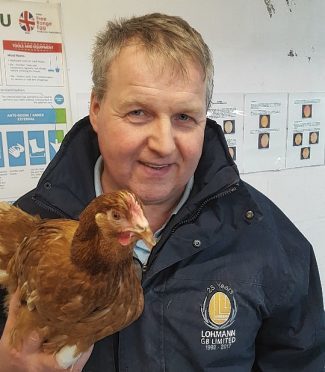The Avian Influenza Prevention Zone in Scotland is to be extended to the end of April. Is this good news for the Scottish poultry industry?
With amended biosecurity measures, which will start at the end of February, producers will be allowed to let their birds outside. They will have to put in place additional biosecurity measures to minimise contact with wild birds.
This means birds can go outside from March 1 but what has changed? Has the threat of avian influenza (AI) from wild birds decreased? No, as I write this article there is a new case in Suffolk. This will be the ninth case of the H5N8 strain of AI in domestic poultry and captive birds in the UK since the autumn. But mainland Europe has been harder hit with far more cases so far.
Under the EU egg marketing rules for free-range hens there is a derogation which allows birds to be housed for up to 12 weeks without the loss of their free-range status. The birds have been housed since December and the 12-week period comes to an end on February 28 and if the birds are not allowed out after this date their eggs can no longer be marketed as free-range.
What does this mean for producers worried about their birds getting AI? Margins are very tight with the feed price up by more than £40 per tonne than last year, with the same egg price.
Do we keep them in and get our eggs downgraded to barn and take a hit of 20p a dozen and lose money or put them out and keep our fingers crossed?
Why are we only allowed to keep the birds in for 12 weeks? Should we not be allowed to keep them in as long there is a risk to the birds?
It has been disappointing to still see a small amount of the backyard flocks in this country still running about outside, with the Scottish Government advice being that they should be housed or covered with nets. Two of the nine cases of AI in the UK have been in backyard flocks and this is a great worry to the poultry industry. It may not mean a lot to them but it hurts the whole industry if their birds come down with AI.
There will be 3km and 10km control zones around an outbreak and licences will need to be applied for to move eggs, birds, feed and everything that needs to be moved on and off the holdings in the control zones. Export of hatching eggs and chicks and poultry products are suspended until the country is clear of AI.
The NFU Scotland (NFUS) poultry working group would like to see the poultry register extended to include all premises that have any poultry and not at present, only if the premises has more than 50 birds. This would help the authorities locate and get in touch with all the premises when there is an outbreak.
It looks like AI is here to stay, so we need to manage it better next year. Did we house the birds too quickly? Or should we manage the country in regions? Will we be allowed to house them longer than 12 weeks? The NFUS will campaign on your behalf to try to get a better solution than at present.
Bob Hay is a poultry farmer at Luncarty Farm, Turriff. He is chairman of NFU Scotland’s poultry working group
